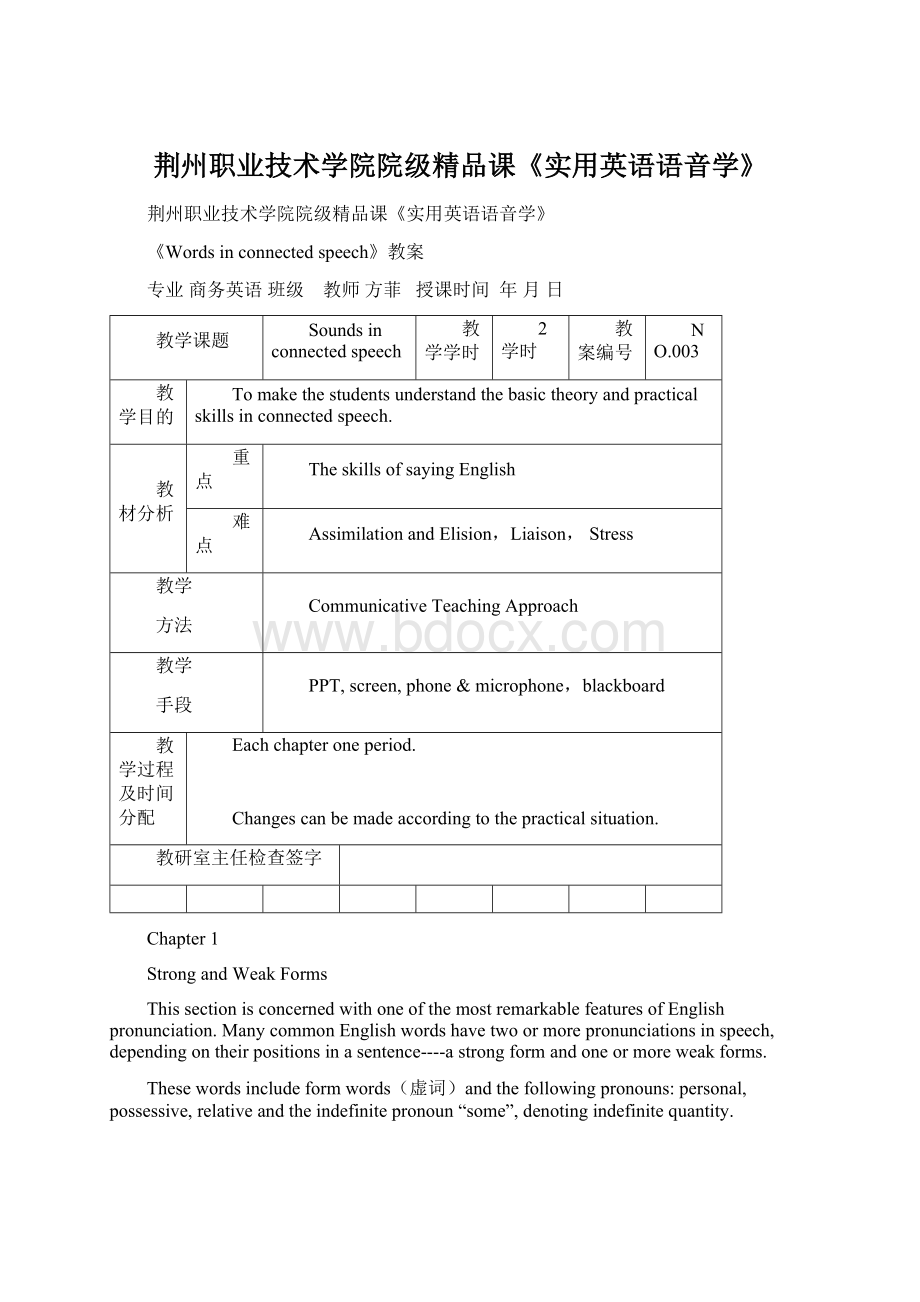荆州职业技术学院院级精品课《实用英语语音学》Word下载.docx
《荆州职业技术学院院级精品课《实用英语语音学》Word下载.docx》由会员分享,可在线阅读,更多相关《荆州职业技术学院院级精品课《实用英语语音学》Word下载.docx(28页珍藏版)》请在冰豆网上搜索。

/,but“Itwastoodifficultforthemtoread.”/itwәz'
tu:
'
difikәltfәð
әmtә'
ri:
d/
Afewwordswith/i:
/inthestrongformhaveaweakformwith/i/;
e.g.the/ð
i:
/,but“theotherend”/ð
i'
Λð
әr'
end/.
Thefollowinglisttellsyouhowtheweakformsareused.
Word
StrongForm
WeakForm
Examples
1.Conjunctions
and
as
but
or
than
that
/æ
nd/
z/
/bΛt/
/ɔ:
/
r/
/ð
æ
n/
t/
/әn/
/n/
/әz/
/bәt/
/ә/
/әr/
әn/
әt/
inandout/in'
nd'
aut/
blackandwhite/'
bæ
lkәn'
wait/
breadandbutter/'
bredn'
bΛtә/
asoldasyou/әz'
әuldәz'
ju:
Butwhynot?
/bәt'
wai'
nt/
twoorthreedays/tu:
әθri:
deiz/
sevenoreight/sevnәreit/(beforevowels)
betterthanever/'
betәð
әn'
evә/
IadmitthatIdidit./aiәd'
mitð
әtai'
didit/
2.Pronouns
he
him
his
her
me
them
us
(rela
-tive)
who
/hi:
/him/
/hiz/
/hә:
/mi:
m/
/Λs/
/hu:
/i(:
)//hi/
/im/
/iz/
/hә//ә/
/hәr/
/mi/
әm/
/әs/
/hu/
Didhewin?
/'
didi:
win/
Givehimtwo./'
givim'
Ilikehistie./ai'
laikiz'
tai/
(inthemiddleofasensegroup)
Takeherhome./'
teikhә'
hәum/
Sheopenedhereyes./ʃi:
әupenedher'
aiz/
(beforevowels)
(Atthebeginningofwordgroupsthestrongformsofthesepronounsshouldbeused.)
Couldyoutellmethetime?
/'
kudju:
telmið
ә'
taim/
Sendthembypost./'
sendð
әmbai'
pәust/
Hewon’tletusdoit./hi:
wәunt'
letәs'
du:
it/
thebookthatIboughtyeaterday
bukð
bɔ:
t'
jestәdi/
theboywholiveshere
bɔihu'
livzhiә/
3.Verbs
am
are
be
been
is
was
were
has
(aux.)
have
had
do
does
can
could
shall
should
will
would
must
/a:
/bi:
/wɔz/
/wә:
/hæ
v/
d/
/du:
/dΛz/
/kæ
/kud/
/ʃæ
l/
/ʃud/
/wil/
/wud/
/mΛst/
/m//әm/
/bi/
/bin/
/s//z/
/wәz/
/wә/
/wәr/
/hәz/
/s/
/z/
/hәv/
/v/
/әv/
/hәd/
/d/
/әd/
/dә//d/
/du/
/dәz/
/kәn/
/kәd/
/ʃl,ʃәl,l/
/ʃәd,ʃd/
/l/
/mәst,mәs/
WhatamItodo?
wɔtәmaitә'
Thedaysareshoter./ð
deizә'
ʃɔ:
tә/
Themenareaway./ð
menәrә'
wei/(beforevowels)
Don’tberude./'
dәuntbi'
ru:
Shehasbeenout./ʃi:
zbin'
That’sfine./ð
ts'
fain/
Heishere./hi:
z'
hiә/
Tomishere./'
tɔmz'
(/z/aftervowelsandvoicedconsonantsexcept/z,ʒ,ʤ/,)
Onewasenough./'
wΛnwәzi'
nΛf/
Theywereverypleased./ð
eiwә'
veri'
pli:
zd/
Thelightswereout./ð
laitswәr'
Haseveryonegone?
/hәz'
evriwΛn'
gɔn/
(/әz/after/s,z,ʧ,ʤ/,/s/after/p,t,k,f,θ/,/z/elsewhere)
Theplacehaschanged./ð
pleisәz'
ʧeinʤd/
(/s/after/p,t,kf,θ/)
It’salreadystarted./itsɔ:
l'
redi'
sta:
tid/
/z/elsewhere
She’sgoneforawalk./ʃi:
gɔnfәrә'
wɔ:
k/
Haveanybeenlost?
enibin'
lɔst/
(/v/afterI,we,you,they)
You’vebrokenit./ju:
v'
brәukәnit/
(/әv/elsewhere)
Themenhavegone./ð
menәv'
gɔn/
Hadanyoneleft./hәd'
eniwΛn'
left/
(/d/afterI,he,she,we,you,they)
They’dlefthome./ð
eid'
left'
Themenhadleft./ð
menәd'
left/
(/dә//d/beforeconsonants)
Sodothey./'
sәudә'
ð
ei/
(/du/beforevowelsand/w/)
SodoI./'
sәudu'
ai/Sodowe./'
wi:
Whendoesthetrainleave?
wendәzð
trein'
li:
HowcanIhelp?
haukәnai'
help/
Wecouldcometomorrow./wi:
kәd'
kΛmtә'
mɔrәu/
Ishalltakeitup./aiʃl'
teikit'
Λp,ail'
Λp/
Weshouldtrytodoitwell./wi:
ʃәd'
traitә'
it'
wel/
(/l/afterpersonalpronouns)
They’llgiveitaway./ð
eil'
givitә'
wei/
Whatwouldyoudo?
/wɔtәdju:
(afterpersonalpronouns)
Iwouldliketotellhim./aid'
laiktә'
telim/
Imustanswerthatletter./aimәst'
a:
nsәð
letә/̗
4.Article
a
an
the
/ei/
i/
ә/
Inaminute/'
inә'
minit/
Haveanapple./hæ
vәn'
pl/
(/ð
i/beforevowels)theotherday/ð
dei/
ә/beforeconsonants)
Whatisthetime?
wɔtsð
5.Prepositions
at
for
from
of
/fɔ:
/frɔm/
/ɔv/
/әt/
/fә/
/fәr/
/frәm/
Comeatonce./'
kΛmәt'
wΛns/
Theysentforthedoctor./ð
ei'
sentfәð
dɔktә/
(/fɔ:
r/,/fәr/beforevowels)
Shallwegoforawalk?
ʃæ
lwi:
gәufәrә'
IsentitfromLondon./ai'
sentitfrәm'
lΛndәn/
Asamatteroffact/әzә'
mæ
tәrәv'
fæ
kt/
6.OtherWords
there
not
to
some
εә/
εәr/
/nΛt/
/tu:
/sΛm/
әr/
/nt/
/tu/
/tә/
/sәm//sm/
Thereisnothingleft./ð
әz'
nΛθiŋ'
left/
εәr/,/ð
әr/beforevowels)/ð
әriz'
(/nt/inspellingn’t)aren’t/a:
nt/don’t/dәunt/
Itdoesnotmatter./itdΛzn'
(/tu/beforevowelsortheconsonant/w/,orattheendofthesentence.)
Iwanttoaskyou./ai'
wɔnttu'
skju/
Iamgoingto./aim'
gәuiŋtu/
(/tә/beforeconsonants)tostayortogo/tә'
steiɔ:
tә'
gәu/
Ineedsomepaper./ai'
ni:
dsәm'
peipә/
Pleasegivemesome./'
givmisәm/
Note:
likethe“to”beforeaninfinitive,thepreposition“to”alsohastwoweakforms:
/tu/and/tә/.
Practicealltheexamplesgivenhere,thenmakeupsimilarexamplesgivenhere,thenmakeupsimilarexamplesforyourselvesandpracticethose,too.
2.TheUseofStrongForms
AsIhavesaid,thesecommonwordswhichhaveweakformsalsohavestrongforms.Thestrongformsareusedinthefollowingcases:
1)Whenthewordisstressed,e.g.
Theydon’tbelieve,dothey?
/ð
dәuntbi'
ei/
Youmustchooseusorthem./ju:
mәst'
ʧu:
Λsɔ:
em/
2)Whenthewordisattheendofasensegrouporasentence,evenwhentheyareunstressed.
e.g.(Whoisondutytoday?
)Iam./'
aiæ
(Who’sgot?
)Janehas./'
ʤeinhæ
(Whoisateacher?
)Youare./'
a:
Whatareyoulookingat?
wɔtәju:
lukiŋæ
Whatishewaitingfor?
wɔtsi:
weitiŋfɔ:
Wheredidyougetitfrom?
wεәdidju:
getitfrɔm/
3)Prepositionsmayhavetheirstrongformswhentheyarefollowedbyanunstressedpersonalpronounattheendofasensegrouporasentence.However,inthispositiontheweakformmayalsobeused.Forexample:
Iamwaitingforyou./aim'
ju:
/or/aim'
weitiŋfәju:
4)Theindefinitepronoun“some”inthemeaningof“acertainquantity”isalwaysstressedandthereforepronounced/sΛm/.Forexample:
someofus/'
sΛmәvәs/
Theadjective“some”inthemeaningof“certain”alwaysuseitsstrongform,evenwhenitisunstressed.Forexample:
Forsomereasonsheisabsenttoday./'
fɔ:
sΛm'
znʃiz'
bsnәttә'
Asanadjectiveincontrastto“others”itisalwaysstressedandthereforepronounced/sΛm/.Forexample:
Somepeoplelikeit,butothersdon’t./'
sΛmpi:
pl'
laikitbәt'
dәunt/
Chapter2
AssimilationandElision
A.Assimilation
Speechsoundsseldomoccurinisolation.Theyarenearlyalwaysjoinedtogethertoformwordsandgroupsofwords.Inconnectedspeech,sounds,undertheinfluenceoftheirneighbors,arereplacedbyothersounds.Sometimestwoneighboringsoundsinfluenceeachotherandarereplacedbyathirdsoundwhichisdifferentfromboththeoriginalsounds.Thisprocessiscalledassimilation.
AssimilationisverycommonincolloquialanddialectalEnglish.Ittakesplacemostfrequentlyinconsonant.Thecauseoftheprocessistosaveeffortandtomakethepronunciationofthetwodissimilarconsonantseasierbytakingshortcuts.
Assimilationmaybeof3typesasfarasitsdirectionisconcerned:
1)Progressive(顺同化),theassimilatedsoundisinfluencedbytheprecedingsound.Forexample:
What’sthis?
wɔts'
is/
Theconsonantsound/z/isreplacedbythesound/s/undertheinfluenceofsound/t/
Inassimilationoftype1thestrongvoicelessconsonantofapairreplacestheweakvoicedconsonantinthecloselyconnectedspeech,butdonotmakeitageneralruletoreplacetheweakvoicedconsonantbythestrongvoicelessinothercases.Andyoumustrememberthatavoicelessplosiveorfricative(摩擦音)isnotassimilatedtoavoi